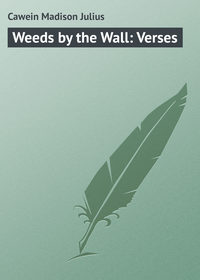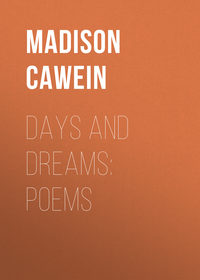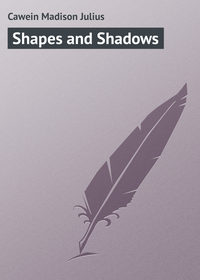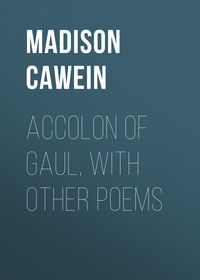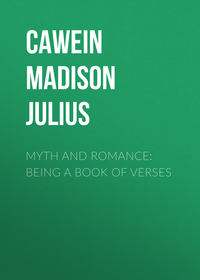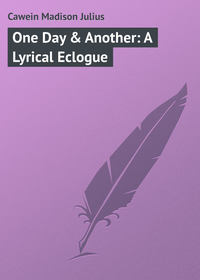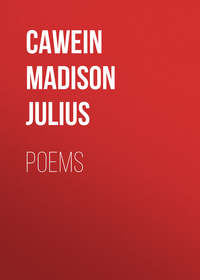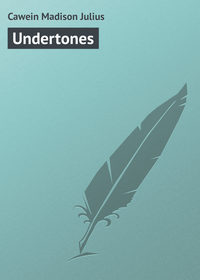The Poems of Madison Cawein. Volume 2 (of 5)
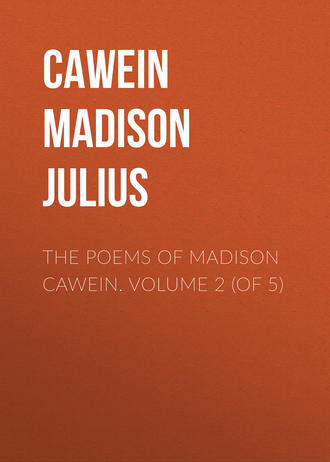 полная версия
полная версияThe Poems of Madison Cawein. Volume 2 (of 5)
Жанр: зарубежная поэзиязарубежная классиказарубежная старинная литературастихи и поэзиясерьезное чтениеcтихи, поэзия
Язык: Английский
Год издания: 2018
Добавлена:
Настройки чтения
Размер шрифта
Высота строк
Поля
VI
She sings:Over the fields of milletA young bird tries its wings;And wild as a woodland rillet,Its first mad music rings rings—Soul of my soul, where the meadows rollWhat is the song it sings?“Love, and a glad good-morrow,Heart where the rapture is!Good-morrow, good-morrow!Adieu to sorrow!Here is the road to bliss:Where all day long you may hearken my song,And kiss, kiss, kiss;”Over the fields of clover,Where the wild bee drones and sways,The wind, like a shepherd lover,Flutes on the fragrant ways—Heart of my heart, where the blossoms part,What is the air he plays?“Love, and a song to follow,Soul with the face a-gleam!Come follow, come follow,O’er hill and through hollow,To the land o’ the bloom and beam:Where, under the flowers, you may listen for hours,And dream, dream, dream!”VII
He speaks, letting the boat drift:Here the shores are irised; grassesClump the water gray, that glassesBroken wood and deepened distance.Far the musical persistenceOf a field-lark lingers lowIn the west’s rich tulip-glow.White before us flames one pointedStar; and Day hath Night anointedKing; from out her azure ewerPouring starry fire, truerThan pure gold. Star-crowned he standsWith the starlight in his hands.Will the moon bleach through the raggedTree-tops ere we reach yon jaggedRock that rises gradually,Pharos of our homeward valley?—All the west is smouldering red;Embers are the stars o’erhead.At my soul some Protean elf is:You ’re Simætha; I am Delphis,You are Sappho and your Phaon,I.—We love.—There lies our way, on,—Let us say,—Æolian seas,To the violet Lesbian leas.On we drift. I love you. NearerLooms our Island. Rosier, clearer,The Leucadian cliff we follow,Where the temple of ApolloShines—a pale and pillared fire....Strike, oh, strike the Lydian lyre!—Out of Hellas blows the breezeSinging to the Sapphic seas.VIII
Landing, he sings:Night, night, ’t is night. The moon drifts low above us,And all its gold is tangled in the stream:Love, love, my love, and all the stars, that love us,The stars smile down and every star ’s a dream.In odorous purple, where the falling warbleOf water cascades and the plunged foam glows,A columned ruin lifts its sculptured marbleFriezed with the chiselled rebeck and the rose.She sings:Sleep, sleep, sweet sleep sleeps at the drifting tiller,And in our sail the Spirit of the Rain—Love, love, my love, ah, bid thy heart be stiller,And, hark! the music of the singing main.What flowers are those that blow their balm unto us,From mouths of wild aroma, each a flame?—Or is it Love that breathes? sweet Love who drew us,Who kissed our eyes and made us see the same?He speaks:Dreams; dreams we dream! no dream that we would banish!The temple and the nightingale are there!Our love hath made them, nevermore to vanish,Real as yon moon, this wild-rose in your hair.Night, night, ’tis night!—and Love’s own star ’s before us,Its starred reflection in the starry stream.—Yes, yes, ah yes! his presence shall watch o’er us,To-night, to-night, and every night we dream.IX
Homeward through flowers; she speaks:Behold the offerings of the common hills!Whose lowly names have made them three times dear:One evening-primrose and an apron-fullOf violets; and there, in multitudes,Dim-seen in moonlight, sweet cerulean wan,The bluet, making heaven of every dellWith morn’s ambrosial blue: dew-dropping plumesOf the mauve beard’s-tongue; and the red-freaked cupsOf blackberry-lilies all along the creek,Where, lulled, the freckled silence sleeps, and vagueThe water flows, when, at high noon, the cowsWade knee-deep, and the heat is honied withThe drone of drowsy bees and dizzy flies.How bright the moon is on that fleur-de-lis;Blue, streaked with crystal like a summer day:And is it moonlight there? or is it flowers?White violets? lilies? or a daisy bed?And now the wind, with softest lullaby,Swings all their cradled heads and rocks-to-sleepTheir fragrant faces and their golden eyes,Curtained, and frailly wimpled with the dew.Simple suggestions of a life most fair!Flowers, you speak of love and untaught faith,Whose habitation is within the soul,Not of the Earth, yet for the Earth indeed....What is it halcyons my heart? makes calm,With calmness not of knowledge, all my soulThis night of nights?—Is ’t love? or faith? or both?—The lore of all the world is less than theseSimple suggestions of a life most fair,And love most sweet that I have learned to know!X
He speaks, musingly:Yes, I have known its being so;Long ago was I seeing so—Beckoning on to a fairer land,Out of the flowers it waved its hand;Bidding me on to life and love,Life with the hope of the love thereof.What is the value of knowing it,If you are shy in showing it?—Need of the earth unfolds the flower,Dewy sweet, at the proper hour;And, in the world of the human heart,Love is the flower’s counterpart.So when the soul is heedable,Then is the heart made readable.—I in the book of your heart have readWords that are truer than truth hath said:Measures of love, the spirit’s song,Writ of your soul to haunt me long.Love can hear each laudableThought of the loved made audible,Spoken in wonder, or joy, or pain,And reëcho it back again:Ever responsive, ever awake,Ever replying with ache for ache.XI
She speaks, dreamily:Earth gives its flowers to usAnd heaven its stars. Indeed,These are as lips that woo us,Those are as lights that lead,With love that doth pursue us,With hope that still doth speed.Yet shall the flowers lie riven,And lips forget to kiss;The stars fade out of heaven,And lights lead us amiss—As love for which we ’ve striven;As hope that promises.XII
He laughs, wishing to dispel her seriousness:If love I have had of you, you had of me,Then doubtless our loving were over;One would be less than the other, you see;Since what you returned to your loverWere only his own; and—XIII
She interrupts him, speaking impetuously:But if I lose you, if you part with me,I will not love you lessLoving so much now. If there is to beA parting and distress,—What will avail to comfort or relieveThe soul that’s anguished most?—The knowledge that it once possessed, perceive,The love that it has lost.You must acknowledge, under sun and moonAll that we feel is old;Let morning flutter from night’s brown cocoonWide wings of flaxen gold;The moon burst through the darkness, soaring o’er,Like some great moth and white,These have been seen a myriad times beforeAnd with renewed delight.—So ’tis with love;—how old yet new it is!—This only should we heed,—To once have known, to once have felt love’s bliss,Is to be rich indeed.—Whether we win or lose, we lose or win,Within our gain or lossSome purpose lies, some end unseen of sin,Beyond our crown or cross.XIV
Nearing her home, he speaks:True, true!—Perhaps it would be bestTo be that lone star in the west;Above the earth, within the skies,Yet shining here in your blue eyes.Or, haply, better here to blowA flower beneath your window low;That, brief of life and frail and fair,Finds yet a heaven in your hair.Or well, perhaps, to be the breezeThat sighs its soul out to the trees;A voice, a breath of rain or drouth,That has its wild will with your mouth.These things I long to be. I longTo be the burthen of some songYou love to sing; a melody,Sure of sweet immortality.XV
At the gate. She speaks:Sunday shall we ride together?Not the root-rough, rambling wayThrough the wood we went that day,In last summer’s sultry weather.Past the Methodist camp-meeting,Where religion helped the hymnGather volume; and a slimMinister, with textful greeting,Welcomed us and still expounded.—From the service on the hillWe had passed three hills and stillLoud, though far, the singing sounded.Nor that road through weed and berryDrowsy days led me and youTo the old-time barbecue,Where the country-side made merry.Dusty vehicles together;Darkies with the horses nearTied to trees; the atmosphereRedolent of bark and leather,And of burgoo and of beef; thereRoasting whole within the trench;Near which spread the long pine benchUnder shading limb and leaf there.As we went the homeward journeyYou exclaimed, “They intermixPleasure there and politics,Love and war: our modern tourney.”And the fiddles!—through the thickets,How they thumped the old quadrille!Scraping, droning on the hill,It was like a swarm of crickets....Neither road! The shady quietOf that path by beech and birch,Winding to the ruined churchNear the stream that sparkles by it.Where the silent Sundays listenFor the preacher—Love—we bringIn our hearts to preach and singWeek-day shade to Sabbath glisten.XVI
He, at parting:Yes, to-morrow. Early morn.—When the House of Day unclosesPortals that the stars adorn,—Whence Light’s golden presence throws hisFlaming lilies, burning roses,At the wide wood’s world of wall,Spears of sparkle at each fall:Then together we will rideTo the wood’s cathedral places;Where, like prayers, the wildflowers hide,Sabbath in their fairy faces;Where, in truest, untaught phrases,Worship in each rhythmic word,God is praised by many a bird.Look above you.—Pearly white,Star on star now crystallizesOut of darkness: Afric nightHangs them round her like devicesOf strange jewels. Vapor rises,Glimmering, from each wood and dell.—Till to-morrow, then, farewell.XVII
She tarries at the gate a moment, watching him disappear down the lane. He sings, and the sound of his singing grows fainter and fainter and at last dies away in the distance:
Say, my heart, O my heart,These be the eves for speaking!There is no wight will work us spiteBeneath the sunset’s streaking.Yes, my sweet, O my sweet,Now is the time for telling!To walk together in starry weatherDown lanes with elder smelling.O my heart, yes, my heart,Now is the time for saying!When lost in dreams each wildflower seemsAnd every blossom praying.Lean, my sweet, listen, sweet,—No sweeter time than this is,—So says the rose, the moth that knows,—To take sweet toll in kisses.PART III
LATE SUMMER
I
Musing, he strolls among the quiet lanes by farm and field:Now rests the season in forgetfulness,Careless in beauty of maturity;The ripened roses round brown temples, sheFulfils completion in a dreamy guess.Now Time grants night the more and day the less:The gray decides; and brown,Dim golds and drabs in dulling green expressThemselves and redden as the year goes down.Sadder the fields where, thrusting hoary highTheir tasseled heads, the Lear-like corn-stocks die,And, Falstaff-like, buff-bellied pumpkins lie.—Deeper to tenderness,Sadder the blue of hills that lounge alongThe lonesome west; sadder the songOf the wild red-bird in the leafage yellow.—Deeper and dreamier, ay!Than woods or waters, leans the languid skyAbove lone orchards where the cider-pressDrips and the russets mellow.Nature grows liberal: from the beechen leavesThe beech-nuts’ burrs their little pockets thrust,Bulged with the copper of the nuts that rust;Above the grass the spendthrift spider weavesA web of silver for which dawn designsThrice twenty rows of pearls: beneath the oak,That rolls old roots in many gnarly lines,—The polished acorns, from their saucers broke,Strew oval agates.—On sonorous pinesThe far wind organs; but the forest nearIs silent; and the blue-white smokeOf burning brush, beyond that field of hay,Hangs like a pillar in the atmosphere;But now it shakes—it breaks and all thevines And tree-tops tremble;—see! the wind is here!Billowing and boisterous; and the smiling dayRejoices in its clamor. Earth and skyResound with glory of its majesty,Impetuous splendor of its rushing by.—But on those heights the forest still is still,Expectant of its coming.... Far awayEach anxious tree upon each waiting hillTingles anticipation, as in graySurmise of rapture. Now the first gusts play,Like laughter low, about their rippling spines;And now the wildwood, one exultant sway,Shouts—and the light at each tumultuous pause,The light that glooms and shines,Seems hands in wild applause.How glows that garden! though the white mists keepThe vagabonding flowers reminded ofDecay that comes to slay in open love,When the full moon hangs cold and night is deep;Unheeding still, their cardinal colors leapAnd laugh encircled of the scythe of death,—Like lovely children he prepares to reap,—Staying his blade a breathTo mark their beauty ere, with one last sweep,He lays them dead and turns away to weep.—Let me admire,—Before the sickle of the coming coldShall mow them down,—their beauties manifold:How like to spurts of fireThat scarlet salvia lifts its blooms, which heapYon square of sunlight. And, as sparkles creepThrough charring parchment, up that window’s screenThe cypress dots with crimson all its green,The haunt of many bees.Cascading dark those porch-built lattices,The nightshade bleeds with berries; drops of blood,Hanging in clusters, ’mid the blue monk’s-hood.There, in that garden old,The bright-hued clumps of zinnias unfoldTheir formal flowers; and the marigoldLifts its pinched shred of orange sunset caughtAnd elfed in petals. The nasturtium,All pungent leaved and acrid of perfume,Hangs up its goblin bonnet, fairy-broughtFrom Gnomeland. There, predominant red,And arrogant, the dahlia lifts its head,Beside the balsam’s rose-stained horns of honey,Deep in the murmuring, sunny,Dry wildness of the weedy flower-bed;Where crickets and the weed-bugs, noon and night,Shrill dirges for the flowers that soon will die,And flowers already dead.—I seem to hear the passing Summer sigh:A voice, that seems to weep,“Too soon, too soon the Beautiful passes by!And soon, amid her bowers,Will dripping Autumn mourn with all her flowers.”—If I, perchance, might peepBeneath those leaves of podded hollyhocks,That the bland wind with odorous whispers rocks,I might behold her,—whiteAnd weary,—Summer, ’mid her flowers asleep,Her drowsy flowers asleep,The withered poppies knotted in her locks.II
He is reminded of another day with her:The hips were reddening on this rose,Those haws were hung with fire,That day we went this way that goesUp hills of bough and brier.This hooked thorn caught her gown and seemedImploring her to linger;Upon her hair a sun-ray streamedLike some baptizing finger.This false-foxglove, so golden nowWith yellow blooms, like bangles,Was bloomless then. But yonder bough,—The sumac’s plume entangles,—Was like an Indian’s painted face;And, like a squaw, attendedThat bush, in vague vermilion grace,With beads of berries splendid.And here we turned to mount that hill,Down which the wild brook tumbles;And, like to-day, that day was still,And mild winds swayed the umbelsOf these wild-carrots, lawny gray:And there, deep-dappled o’er us,An orchard stretched; and in our wayDropped ripened fruit before us.With muffled thud the pippin fell,And at our feet rolled dusty;A hornet clinging to its bell,The pear lay bruised and rusty:The smell of pulpy peach and plum,From which the juice oozed yellow,—Around which bees made sleepy hum,—Made warm the air and mellow.And then we came where, many-hued,The wet wild morning-gloryHung its balloons in shadows dewedFor dawning’s offertory:With bush and bramble, far away,Beneath us stretched the valley,Cleft of one creek, as clear as day,That rippled musically.The brown, the bronze, the green, the redOf weed and brier ran riotTo walls of woods, whose pathways ledTo nooks of whispering quiet:Long waves of feathering goldenrodRan through the gray in patches,As in a cloud the gold of GodBurns, that the sunset catches.And there, above the blue hills rolled,Like some far conflagration,The sunset, flaming marigold,We watched in exultation:Then, turning homeward, she and IWent in love’s sweet derangement—How different now seem earth and sky,Since this undreamed estrangement.III
He enters the woods. He sits down despondently:Here where the day is dimmest,And silence company,Some might find sympathyFor loss, or grief the grimmest,In each great-hearted tree—Here where the day is dimmest—But, ah, there ’s none for me!In leaves might find communion,Returning sigh for sigh,For love the heavens deny;The love that yearns for union,Yet parts and knows not why.—In leaves might find communion—But, ah, not I, not I!My eyes with tears are aching.—Why has she written me?And will no longer see?—My heart with grief is breaking,With grief that this should be.—My eyes with tears are aching—Why has she written me?IV
He proceeds in the direction of a stream:Better is death than sleep,Better for tired eyes.—Why do we weep and weepWhen near us the solace lies?There, in that stream, that, deep,—Reflecting woods and skies,—Could comfort all our sighs.The mystery of things,Of dreams, philosophies,To which the mortal clings,That can unriddle these.—What is ’t the water sings?What is ’t it promises?—End to my miseries!V
He seats himself on a rock and gazes steadily into the stream:And here alone I sit and it is so!—O vales and hills! O valley-lands and knobs!What cure have you for woe?What balm that robsThe brain of thought, the knowledge of its woe?None! none! ah me! that my sick heart may know!—The wearying sameness!—yet this thing is so!This thing is so, and still the waters flow,The leaves drop slowly down; the daylight throbsWith sun and wind, and yet this thing is so!There is no sympathy in heaven or earthFor human sorrow! all we see is mirth,Or madness; cruelty or lust;Nature is heedless of her children’s grief;Man is to her no more than is a leaf,That buds and has its summer, that is brief,Then falls, and mixes with the common dust.Here, at this culvert’s mouth,The shadowy water, flowing toward the south,Seems deepest, stagnant-stayed.—What is it yonder that makes me afraid?Of my own self afraid?—I do not know!—What power draws me to the striate stream?What evil? or what dream?Me! dropping pebbles in the quiet wave,That echoes, strange as music in a cave,Hollow and thin; vibrating in the shade,As if ’t were tears that fell, and, falling, madeA crystal sound, a shadow wail of woe,Wrung from the rocks and waters there below;An ailing phantom that will not be laid;Complaining ghosts of sobs that fill my breast,—That will not forth,—and give my heart no rest.There, in the water, how the lank sword-grassMats its long blades, each blade a crooked kris,Making a marsh; ’mid which the currents missTheir rock-born melodies.But there and there, one seesThe wide-belled mallow, as within a glass,Long-pistiled, leaning o’erThe root-contorted shore,As if its own pink image it would kiss.And there the tangled wild-potato vineLifts beakered blossoms, each a cup of wine,As pale as moonlight is:—No mandrake, curling convolutions up,Loops heavier blossoms, each a conical cupThat swoons moon-nectar and a serpent’s hiss.—And there tall gipsy lilies, all a-sway,Of coppery hueStreaked as with crimson dew,Mirror fierce faces in the deeps,O’er which they lean, bent in inverted view.—And where the stream around those rushes creeps,The dragon-fly, in endless error, keepsSewing the pale-gold gown of dayWith tangled stitches of a burning blue:Its brilliant body is a needle fine,A thread of azure ray,Black-pinioned, shuttling the shade and shine.But here before me where my pensive shadeLooks up at me, the stale stream, stagnant, lies,Deep, dark, but clear and silent; streaked with huesOf ragweed pollen, and of spawny ooze,Through which the seeping bubbles, bursting, rise.—All flowers here refuseTo grow or blossom; beauties, too, are few,That haunt its depths: no glittering minnows braidIts sleepy crystal; and no gravels strewWith colored orbs its bottom. Half afraidI shrink from my own eyesThere in its cairngorm of reflected skies.—I know not why, and yet it seems I see—What is ’t I see there moving stealthily?I know not what!—But where the kildees wade,Slim in the foamy scum,From that direction hither doth it come,Whate’er it is, that makes my soul afraid.Nearer it draws to where those low rocks ail,Warm rocks, on which some water-snake hath clomb,Basking its spotted body, coiling numb,Brown in the brindled shade.—At first it seemed a prism on the grail,A bubble’s prism, like the shadow madeOf water-striders; then a trail,An angled sparkle in a webby veilOf duckweed, green as verdigris, it swayedFrog-like through deeps, to crouch, a flaccid, pale,Squat bulk below....I gaze, and though I would, I can not go.Reflected trees and skies,And breeze-blown clouds that lounge at sunny loss,Seem in its stolid eyes,Its fishy gaze, that holds me in strange wise.Ghoul-like it seems to rise,And now to sink; its eldritch features fail,Then come again in rhythmic waviness,With arms like tentacles that seem to pressThro’ weed and water: limbs that writhe and fade,And clench, and twist, and toss,Root-like and gnarled, and cross and inter-crossThrough flabby hair of smoky moss.How horrible to see this thing at night!Or when the sunset slants its brimstone lightAbove the pool! when, blue, in phantom flight,The will-o’-the-wisps, perhaps, above it reel.Then, haply, would it rise, a rotting green,Up, up, and gather me with arms of steel,Soft steel, and drag me where the wave is white,Beneath that boulder brown, that plants a keelAgainst the ripple there, a shoulder lean.—No, no! I must away before ’tis night!Before the fireflies dotThe dark with sulphur blurrings bright!Before, upon that height,The white wild-carrots vanish from the sight;And boneset blossoms, tossing there in clusters,Fade to a ridge, a streak of ghostly lustres:And, in that sunlit spot,Yon cedar tree is not!But a huge cap instead, that, half-asleep,Some giant dropped while driving home his sheep:And ’mid those fallow brownsAnd russet grays, the fragrant peakOf yonder timothy stack,Is not a stack, but something hideous, black,That threatens and, grotesquely demon, frowns.I must away from here.—Already dusk draws near.The owlet’s dolorous hootSounds quavering as a gnome’s wild flute;The toad, within the wet,Begins to tune its goblin flageolet:The slow sun sinks behindThose hills; and, like a withered cheekOf Quaker quiet, sorrow-burdened, thereThe spectral moon ’s definedAbove those trees,—as in a wild-beast’s lairA golden woman, dead, with golden hair,—Above that mass of fox-grape vinesThat, like a wrecked appentice, roofs those pines.—Oh, I am faint and weak.—I must away, away!Before the close of day!—Already at my backI feel the woods grow black;And sense the evening wind,Guttural and gaunt and blind,Whining behind me like an unseen wolf.Deeper now seems the gulfInto whose deeps I gaze;From which, with madness and amaze,That seems to rise, the horror there,With webby hands and mossy eyes and hair.—Oh, will it pierce,With all its feelers fierce,Beyond the pool’s unhallowed water-streak?—Yes; I must go, must go!Must leave this ghastly creek,This place of hideous fear!For everywhere I hearA dripping footstep near,A voice, like water, gurgling at my ear,Saying, “Come to me! come and rest below!Sleep and forget her and with her thy woe!”—I try to fly.—I can not.—Yes, and no!—What madness holds me!—God! that obscene, slow,Sure mastering chimera there,Perhaps, has fastened round my neck,Or in my matted hair,Some horrible feeler, dire, invisible!—Off, off! thou hoop of Hell!Thou devil’s coil!…Back, back into thy cesspool! Off of me!—See, how the waters thrash and boil!At last! at last! thank God! my soul is free!My mind is freed of that vile mesmerismThat drew me to—what end? my God! what end?Haply ’twas merely fancy, that strange fiend:My fancy, and a prismOf sunset in the stream, a firefly fleck,That now, a lamp of golden fairy oil,Lights me my homeward way, the way I flee.No more I stare, magnetic-fixed; nor reck,Nor little care to foilThe madness there! the murder there! that slipsBack to its lair of slime, that seeps and drips,That sought in vain to fasten on my lips.VI
Taking a letter from his pocket, he hurries away:What can it mean for me? what have I done to her?I, in our season of love as a sun to her:She, all my heaven of silvery, numberlessStars and its moon, shining golden and slumberless;Who on my life, that was thorny and lowery,Came—and made beautiful; smiled—and made flowery.She, to my heart and my soul a divinity!She, who—I dreamed!—seemed my spirit-affinity!—What have I done to her? what have I done?What can she mean by this?—what have I said to her?I, who have idolized, worshiped, and pled to her;Sung with her, laughed with her, sorrowed and sighed for her;Lived for her only; and gladly had died for her!See! she has written me thus! she has written me—Sooner would dagger or serpent had smitten me!—Would you had shriveled ere ever you’d read of it,Eyes, that are wide to the grief and the dread of it!—What have I said to her? what have I said?What shall I make of it? I who am trembling,Fearful of losing.—A moth, the dissemblingFlame of a taper attracts with its guttering,Flattering on till its body lies fluttering,Scorched in the summer night.—Foolish, importunate,Why didst thou quit the cool flowers, unfortunate!—Such has she been to me, making me such to her!—Slaying me, saying I never was much to her!—What shall I make of it? what can I make?Love, in thy everglades, moaning and motionless,Look, I have fallen; the evil is potionless:I, with no thought but the day that did lock us in,Set naked feet ’mid the cottonmouth-moccasin,Under the roses, the Cherokee, eying me:—I,—in the heav’n with the egrets that, flying me,Winging like blooms from magnolias, rose slenderly,Pearl and pale pink: where the mocking-bird tenderlySang, making vistas of mosses melodious,Wandered,—unheeding my steps,—in the odiousOoze and the venom. I followed the wiryViolet curve of thy star falling fiery—So was I lost in night! thus am undone!Have I not told to her—living alone for her—Purposed unfoldments of deeds I had sown for herHere in the soil of my soul? their varietyEndless—and ever she answered with piety.See! it has come to this—all the tale’s suavityAt the ninth chapter grows hateful with gravity;Cruel as death all our beautiful history—Close it!—the final is more than a mystery.—Yes; I will go to her; yes; and will speak.

